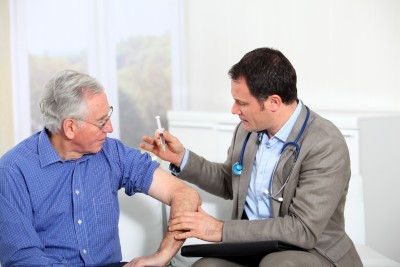August is National Immunization Awareness Month!

As an older adult, you might not think much about getting immunized until it comes time to get your annual flu shot. You may even think you have all the shots you need, but not all vaccines and boosters are administered during childhood.
There are still a number of immunizations that you may want to include in your senior healthcare plan.
Shingles
What is it?
Shingles (herpes zoster) is caused by a reactivation of the chickenpox virus (varicella zoster) in the body. If you have ever had chickenpox, you are at risk for developing shingles.
The reactivated virus becomes more dangerous as you age. It first presents as a painful rash, but extreme cases have been known to cause:
- Pneumonia
- Hearing problems
- Blindness
- Encephalitis
1 in 3 Americans develop shingles. Talk to your doctor about getting vaccinated.
What vaccine do I need?
Immunization is the only known way to prevent shingles. If you’re over the age of 60, ask your healthcare provider if you’ve had the Zostavax vaccine.
Whooping Cough
What is it?
This respiratory illness causes extreme coughing fits that can do major damage to the body:
- sleeplessness
- vomiting
- weight loss
- incontinence
In extreme cases pertussis can lead to:
- rib fractures
- fainting
- pneumonia
- death
Whooping cough (pertussis) may be a disease of youthful memories, but anyone can be at risk, and it is highly contagious. Incident rates in the United States have been rising since the early eighties. The CDC estimates that there were nearly 42,000 cases of whooping cough in 2012 alone.
What vaccine do I need?
The TDaP (Tetanus, Diphtheria, and Pertussis) is a onetime vaccination for adolescents and adults. It was only licensed in 2005, so check your immunization records to see if you’ve been vaccinated.
Some older adults should not receive the vaccination. Talk to your senior healthcare provider.
Diphtheria
What is it?
Diphtheria is an infectious respiratory disease that has been all but eradicated for the US thanks to vaccinations, but illness and death elsewhere in the world. The condition begins as a sore throat and low-grade fever, but as the disease progresses other, deadlier, symptoms can occur:
- breathing problems,
- paralysis,
- heart failure
Because diphtheria can be more severe among adults over age 40, talk to your senior healthcare provider about making sure you have the right vaccinations, especially if you’ve traveled to an area where the disease is still active.
What vaccine do I need?
TDaP or TD (Tetanus and Diphtheria).
While TDaP is a once-in-a-lifetime immunization, TD requires a booster every 10 years. Check with your senior healthcare provider to see what vaccinations you require.
Tetanus
What is it?
Tetanus is a bacterial infection that can be prevented by vaccination. The infection typically enters the bloodstream through a cut or puncture wound and causes stiffness in the neck and jaw which can lead to difficulty swallowing or opening the mouth. As the infection worsens, tetanus can cause:
- breathing problems,
- severe muscle spasms
- seizures
- paralysis
A serious infection can take months to recover from, and if untreated, tetanus can even be fatal.
What vaccine do I need?
TDaP or TD.
Check your immunization records or consult with your senior healthcare provider if you’re uncertain about what vaccinations you’ve had.
Bacterial Pneumonia
What is it?
Pneumonia is a respiratory infection caused by a number of germs, viruses, bacteria, and fungi. Bacterial infections, caused by the pneumococcus bacteria, are among the most preventable forms of pneumonia.
Symptoms of pneumococcal pneumonia include:
- Fever
- Cough
- Shortness of breath
- Chest pain
If you’re over 65 or have certain long-term health problems or autoimmune disease, talk to your healthcare provider about getting vaccinated.
What vaccine do I need?
PPSV23 (Pneumococcal polysaccharide vaccine) protects against 23 different strains of the pneumococcal bacteria.












